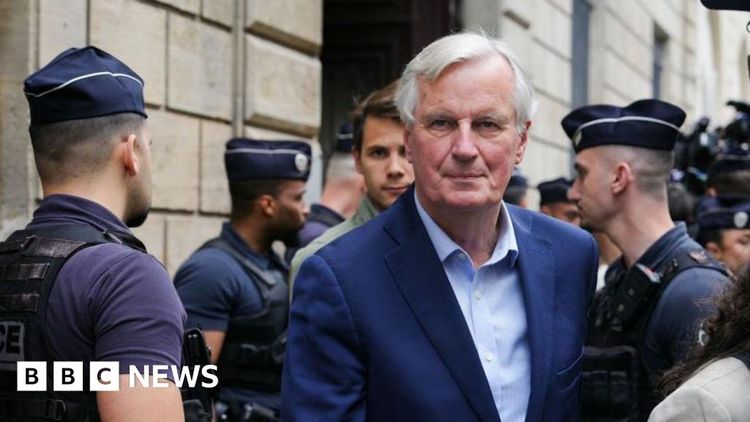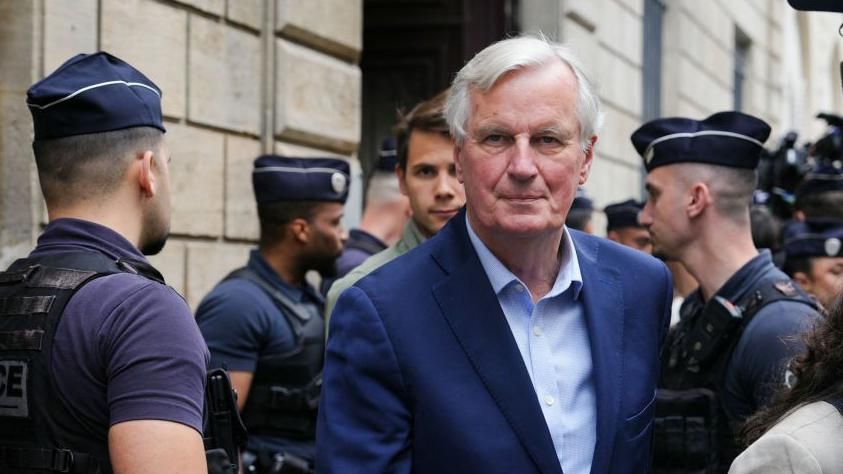Michel Barnier named by Macron as new French PM

Michel Barnier was not initially considered for the position until Wednesday.
French President Macron has chosen Michel Barnier as the new prime minister after France's recent elections resulted in a stalemate.

Mr. Barnier, aged 73, was in charge of negotiating Brexit for the European Union and held discussions with the UK government from 2016 to 2019.
An experienced member of the LR party, he has had a lengthy career in politics and held numerous high-ranking positions, both in France and the EU.
Now, he must create a government that can last with a National Assembly that is split into three major political groups, none of which has enough support to secure a clear majority.
Mr. Barnier is well-known in France as Monsieur Brexit and will become the oldest prime minister in France since the Fifth Republic was established in 1958.
Three years ago, he attempted but was unsuccessful in becoming his party's nominee to challenge President Macron for the French presidency. He expressed his desire to restrict and manage immigration.
He is about to take over from Gabriel Attal, who became the youngest prime minister in France when President Macron appointed him in early 2024. Attal has been serving as the caretaker prime minister since July.
President Macron finally decided on a prime minister after two months, following a period of political calm during the Paris Olympics.
However, Mr. Barnier will have to use his political expertise to handle the next few weeks, as the center-left Socialists are already preparing to dispute his appointment with a vote of confidence.
President Macron chose to delay discussions with political parties about potential candidates until after the Paris Olympics.
Mr Macron will remain as the president until 2027. Typically, the ruling party in the government is the same as the president's, as they are elected within weeks of each other.
However, the man known as the "clock master" turned the situation around by deciding to hold early elections in June. His centrist party ended up in second place, with the left-wing New Popular Front coming out on top.
President Macron met with various possible candidates for the position of prime minister. However, his job was made difficult by the requirement to choose someone who could pass a censure vote during their first speech in the National Assembly.
The Elysée Palace stated that by selecting Mr. Barnier, the president has guaranteed that the prime minister and upcoming government will provide maximum stability and wide-reaching unity.
Mr. Barnier was assigned the responsibility of creating a government that brings people together for the benefit of the country and its citizens, emphasized the presidency.
Mr. Barnier's first task will be to guide the 2025 budget of France and he must present a preliminary proposal to the National Assembly by 1 October.
Gabriel Attal has been working on a temporary budget during the summer, but getting it approved by MPs will need Mr. Barnier's political expertise.
His selection has already stirred up unhappiness within the New Popular Front (NFP), whose chosen candidate for prime minister was turned down by the president.
Jean-Luc Mélenchon, the head of the revolutionary France Unbowed (LFI) - the largest of the four parties in the NFP - claimed that the election had been "taken away from the French citizens".
Rather than being part of the winning alliance on July 7th, he criticized the prime minister for being "a member of the party that finished in last place", mentioning the Republicans.
Mr. Mélenchon stated that the government is now essentially controlled by Macron and Le Pen, referring to the leader of the far-right National Rally (RN).
He asked for people to come and participate in a left-leaning demonstration against Mr. Macron's choice that is scheduled for Saturday.
In order for Mr. Barnier to remain in power, he must convince 289 out of the 577 members of the National Assembly to support his government.
Marine Le Pen has stated that her party will not be involved in his government, but she acknowledged that he seemed to fulfill National Rally's first condition of respecting various political parties.
Jordan Bardella, the 28-year-old leader of the RN, stated that Mr. Barnier would be evaluated based on his statements, behaviors, and choices regarding France's upcoming budget, which must be presented to parliament by October 1st.
He mentioned that the high cost of living, security concerns, and immigration are significant issues for the people of France. He also stated that they are prepared to take political action if these issues are not addressed in the near future.
Picture credit, Getty Images
Jordan Bardella and Marine Le Pen have decided to not join a potential government led by Michel Barnier. Instead, they will observe and evaluate the actions taken by Barnier's government before making any decisions.
It is expected that Mr. Barnier will receive backing from the president's centrist Ensemble alliance. Yaël Braun-Pivet, a close associate of Macron and the president of the National Assembly, praised the nominee and stated that members of parliament must fulfill their duties according to their mandate.
The ex-Brexit negotiator was only considered as a possible candidate towards the end of Wednesday afternoon.
Before that time, two other seasoned politicians were considered the most probable choices: former Socialist prime minister Bernard Cazeneuve and Republicans regional leader Xavier Bertrand. However, it quickly became clear that neither would have been able to garner enough support in a confidence vote.
Mr. Macron decided against selecting Lucie Castets as the left-wing candidate because he believed she would not have been able to handle the challenges that lay ahead.
Many people have spoken out against the president for causing the political turmoil in France.
A new survey showed that more than half of the voters in France believed that the president should step down.
It's unlikely, but the person Mr. Macron chose as his initial prime minister in 2017, Édouard Philippe, has decided to run for the upcoming presidential election, three years ahead of schedule.









































